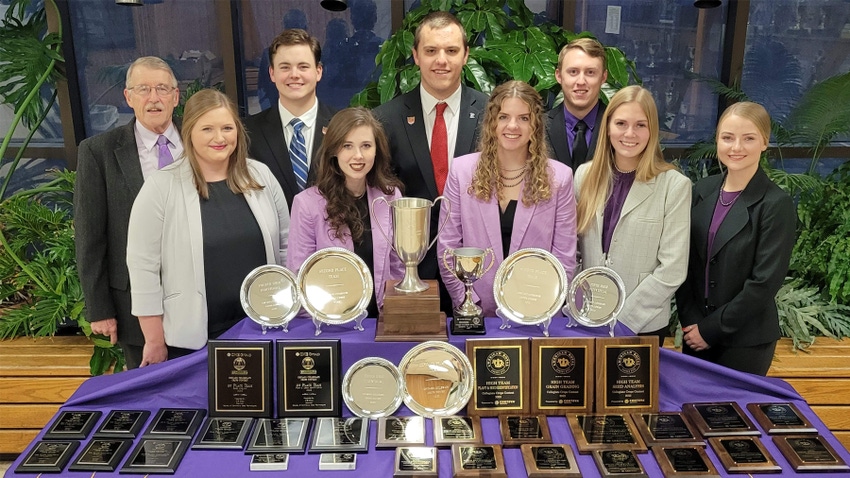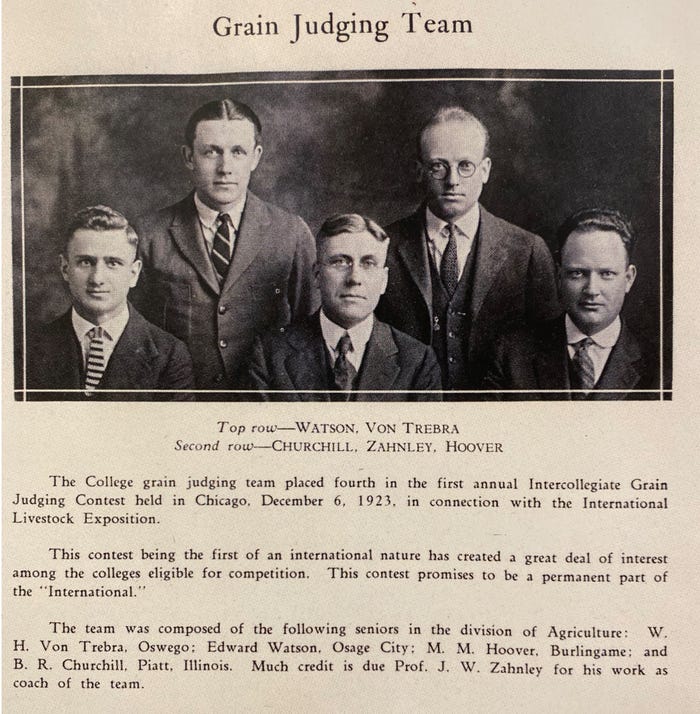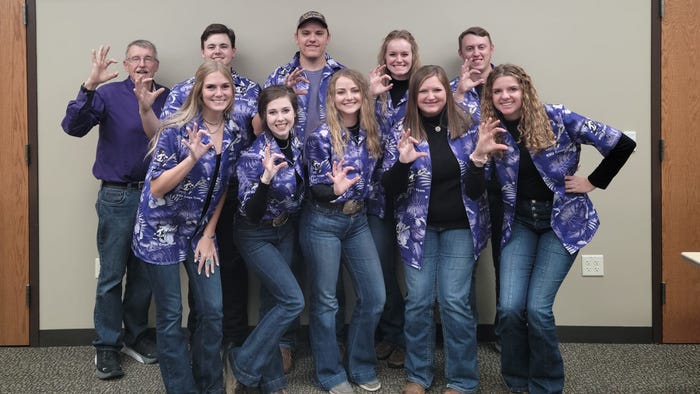
Kansas State University is a national powerhouse on the field.
The crops field, that is.
Over the course of a century, the K-State Crops Judging Team has brought home 46 national championship trophies — enough to fill a trophy case in Throckmorton Hall and create an agronomic dynasty.
“Everyone loves our Crops Team heritage, which is unique and special for us here on campus,” says Rachel Veenstra, K-State assistant professor of crop science and Crops Team coach. It’s a story that goes all the way back to 1923, and the very first National Crops Contest.

ONE HUNDRED YEARS: The first Crops Judging Team from then Kansas State Agricultural College consisted of four seniors who traveled to the Intercollegiate Grain Judging Contest in Chicago at the International Livestock Exposition in 1923. They took home fourth place and included: W.H. Von Treba, Oswego, Kan.; Edward Watson, Osage City, Kan.; M.W. Hoover, Burlingame, Kan.; and B.R. Churchill, Piatt, Ill. They were coached by Professor J.W. Zahnley, assisted by C.D. Davis. (Historical photo from the KSU Crops Judging archives)
“The first Crops Contest was held in 1923 in Chicago as an added competition at the International Livestock Exposition and International Hay and Grain Show,” Veenstra explains The Kansas State Agricultural College (the precursor to K-State) team was four senior agriculture majors: W.H. Von Treba, Oswego, Kan.; Edward Watson, Osage City, Kan.; M.W. Hoover, Burlingame, Kan.; and B.R. Churchill, Piatt, Ill. They were coached by Professor J.W. Zahnley, assisted by C.D. Davis. Veenstra says that first team placed fourth in the first contest. But the team that followed the next year took first place, and the dynasty was begun.
In 1929, The American Royal began its Crops Contest, a fall contest. Veenstra says most of the past 100 years of contest wins are from the fall contests in Kansas City and Chicago. But in 1996, the North American Colleges and Teachers in Agriculture (NACTA) rolled out a spring Crops Contest, and the K-State team has competed in it since its inception.
Over 100 years, the “Fall Team” has 31 championships, some of which are shared titles; the “Spring Team” has 15 championships.
Heads above the rest
So, how do you get a reputation as a crops judging dynasty? It takes dedication and practice, say current team members, juniors Landon Trout and Renae Sinclair.
Sinclair, from Alamosa, Colo., is majoring in agronomy, consulting and production option, with a minor in ag business. She had a knack for crops judging in high school, and being able to compete on K-State’s Crops Team was one of the recruitment points that attracted her to Manhattan, over her family’s ties to Colorado State University.
And for Trout, majoring in agronomy with a minor in plant pathology, joining the Crops Team felt like a natural extension of his major. The two field questions all the time about just what they do as crops judgers.
“A lot of people actually don’t understand what crop judging is like,” Sinclair says.
The fall contest consists of the traditional three events: Plant and Seed Identification, Seed Analysis and Grain Grading.
The spring contest features four events that are based on skills that farmers and field agronomists might use regularly: Plant and seed identification; a lab practical; a knowledge exam; and agronomic calculations. The lab practical, for example, is a set of 75 hands-on applied agronomy questions that solve a scenario.
“All of these events take a lot of practice and attention to detail,” Veenstra says. “Perhaps the most useful career-driven aspect is the spring contest, which mimics a Certified Crop Adviser exam.”
“I love identification, but seed analysis is really my thing,” Sinclair said. In seed analysis, a judger has to sort through a sample of a grain and identify any small weed seeds or anomalies in the sample. It’s intricate work, but it’s something that USDA grain graders do on a regular basis.

OUTSTANDING IN THEIR FIELD: The Fall 2022 K-State Crops Judging Team includes Leah Hudson (front row, left), Ashley Chandler (a 2022 champion), Renae Sinclair, Assistant Coach Sarah Frye and Ellie Braun (a 2022 champion). In back row from left are former Coach Kevin Donnelly, Landon Trout, Jarek Meyer (a 2022 champion), Coach Rachel Veenstra and Assistant Coach Luke Ryan. (Courtesy of K-State Crops Judging Team)
It takes a lot of time management to be on the Crops Team, Sinclair and Trout agree. Team members are juggling not only their schoolwork and class schedules, but also any other university clubs and activities, and morning practices ranging from three to six hours a week.
Having a network is key
Veenstra says any student can be a member of the Crops Team, although most members are enrolled in the College of Agriculture. She coordinates the Kansas FFA Agronomy Contest, and teaches a crop science course for incoming freshman students — both great ways to identify potential members, like Trout.
It’s not just a recruitment tool for the College of Agriculture, but also a recruitment tool for industry professionals who themselves are Crops Team alumni. Both Sinclair and Trout say that legacy is something that connects them to alumni and motivates them.
“It makes you take it more seriously, I think; it kind of drives you to do better,” Trout added.
Veenstra says as a coach, she’s not only trying to win titles, but also to instill skills into team members that will take them far in their careers. It’s something she learned from her predecessor Kevin Donnelly, retired professor of agronomy. From fine-tuning attention to details, to instilling a sense of motivation and drive, to learning how to lose gracefully and work harder to win the next time, there are soft skills to be developed from participating in a judging team, she says. She said the best advice she’s been given — and she passes on to team members — is, “You get out what you put in.”
Fundraising matters
There’s no stadium, no sell-out crowds, and no NIL (name, image and likeness) contracts for the Crops Team. Veenstra says just like other academic competition and judging teams, budgets are always tight. Typically, each year the Crops Team takes five to eight students on three weekend trips and two weeklong trips. Those travel costs, as well as costs of supplies and team competition gear, make for an annual cost of around $12,000.
“The K-State Student Governing Association historically covered $2,000 to $3,000, and some of the difference is covered by selling FFA Agronomy CDE study kits to high schools,” she says. But if the spring contest location requires airline tickets, or costs rise, the fundraising needs are greater.
“Currently, the Kansas Crop Improvement Association is our major donor, and their dedication to helping our students compete makes a tremendous difference every year,” she says.
K-State alumni and friends support the Crops Team, taking about as much pride in it as they do in the university’s athletic teams.
“It’s just phenomenal,” she said of the support. “Just seeing how important the Crops Team is to people and how involved they are. The culture of it is just — it’s very, very special.”
She saw firsthand just how special when the team sold T-shirts to celebrate its century mark, and the post went viral on social media, with supporters from all corners of the K-State fandom.
“The folks that were the most excited about it, hyping it and everything were all the big K-State athletic fans,” Veenstra says with a grin. “It’s been cool to see that mesh of those cultures.”
About the Author(s)
You May Also Like






